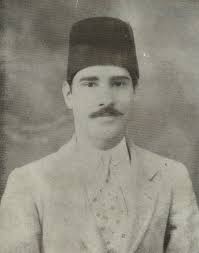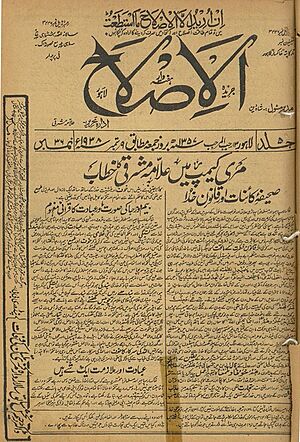Inayatullah Khan Mashriqi facts for kids
Quick facts for kids
Allama
Inayatullah Khan Mashriqi
|
|
|---|---|
 |
|
| Born | 25 August 1888 Amritsar, Punjab, British India
|
| Died | 27 August 1963 (aged 75) |
| Other names | Allama Mashriqi |
| Citizenship | British India (1888-1947) Pakistan (1947-1963) |
| Alma mater | University of the Punjab Christ's College, Cambridge |
| Organization | Khaksar movement |
| Movement | Indian independence movement Opposition to the partition of India |
Inayatullah Khan Mashriqi (Urdu: عنایت اللہ خاں مشرقی; August 1888 – 27 August 1963), also known as Allama Mashriqi, was a very smart mathematician, thinker, and Islamic scholar. He was born in British India and later became a Pakistani. He founded the Khaksar movement.
Around 1930, he started the Khaksar Movement. Its goal was to help Muslims grow in their faith. It also aimed to improve the lives of all people, no matter their beliefs or religion.
Contents
Early Life and Learning
Family Background
Inayatullah Khan Mashriqi was born on August 25, 1888, in Amritsar. His family was a Punjabi Muslim Sulheria Rajput family. Mashriqi's father, Khan Ata Muhammad Khan, was a wealthy and educated man. He owned a newspaper called Vakil. Because of his father's position, young Mashriqi met many important people. These included Jamāl al-Dīn al-Afghānī and Sir Syed Ahmad Khan.
Amazing Education
Mashriqi first learned at home, then went to schools in Amritsar. From a young age, he loved mathematics. He earned his first degree with top honors from Forman Christian College in Lahore. Then, he got his master's degree in mathematics from the University of the Punjab. He was the first person in the university's history to get a First Class in this degree.
In 1907, he moved to England to study at Christ's College, Cambridge. He studied for the mathematics tripos, which is a tough exam series. In 1909, he earned top honors in Mathematics Part I. For the next two years, he studied oriental languages and natural sciences. He got top honors in oriental languages.
By 1910, he had earned his Bachelor of Arts degree. In 1912, he completed a fourth tripos in mechanical sciences. People believed he was the first person ever to achieve honors in four different Triposes. Newspapers across the UK praised him for this amazing achievement. The next year, Mashriqi earned his DPhil (a high-level degree) in mathematics. He received a gold medal at his graduation.
He returned to India in December 1912. His time at Cambridge and the ideas of Professor Sir James Jeans greatly influenced his beliefs about religion and science.
Starting His Career
After returning to India, Mashriqi was offered a high position in a princely state called Alwar. But he turned it down because he was more interested in education. At just 25 years old, he became the vice principal of Islamia College in Peshawar. Two years later, he became the principal. In 1917, he joined the Government of India's Education Department.
In 1920, the British government offered Mashriqi the job of ambassador to Afghanistan. A year later, they offered him a special title called a knighthood. But he said no to both offers.
In 1930, he was not given a promotion he expected in his government job. He then took medical leave. In 1932, he resigned and retired, settling in Ichhra, Lahore.
Nobel Prize Nomination
In 1924, when he was 36, Mashriqi finished the first part of his book, Tazkirah. This book explained the Qur'an using scientific ideas. In 1925, it was nominated for the Nobel Prize. The condition was that it had to be translated into a European language. However, Mashriqi chose not to have it translated.
His Ideas and Movement
Mashriqi's Philosophy
Mashriqi believed that religions and science could work together. He thought that all prophets came to unite people, not to divide them. He said that the main rule of all faiths is to bring all of humanity together. Some people saw Mashriqi as a strong leader and a scientist-philosopher who was ahead of his time.
After leaving government service, Mashriqi started the Khaksar Tehrik (Khaksar Movement) around 1930.
Mashriqi and his Khaksar Movement were against the division of India. He believed that Muslims and Hindus had lived peacefully together for hundreds of years. He thought they could continue to do so in a free and united India. Mashriqi saw the idea of dividing India into two countries as a plan by the British. He felt it would make it easier for them to control the region by causing conflict between the two new countries. He worried that dividing India based on religion would lead to extreme views on both sides.
Challenges and Imprisonments
On July 20, 1943, there was an attempt to harm Muhammad Ali Jinnah. A person named Rafiq Sabir was thought to be a Khaksar worker. Mashriqi strongly said he had nothing to do with the attack. Later, a judge ruled that there was no link between the attack and the Khaksars.
In Pakistan, Mashriqi was put in prison several times. For example, in 1958, he was accused of being involved in the death of a leader named Khan Abdul Jabbar Khan. In 1962, he was suspected of trying to overthrow President Ayub's government. However, the charges were never proven, and he was found innocent in every case.
In 1957, Mashriqi reportedly led 300,000 of his followers towards the borders of Kashmir. It was said they wanted to fight for its freedom. But the Pakistan government convinced the group to turn back. The organization was later ended.
His Final Years
Mashriqi passed away at the Mayo Hospital in Lahore on August 27, 1963. He had been battling cancer. His funeral prayers were held at the Badshahi Mosque. He was buried in Ichhra. He left behind his wife and seven children.
Mashriqi's Writings
Here are some of Mashriqi's important works:
- Armughan-i-Hakeem, a book of poems
- Dahulbab, another book of poems
- Isha’arat, which was the main statement of the Khaksar movement
- Khitab-e-Misr (The Egypt Address), based on a speech he gave in Cairo in 1925
- Maulvi Ka Ghalat Mazhab
- Tazkirah Volume I, published in 1924, which talks about disagreements between religions and between religion and science, and how to solve them
- Tazkirah Volume II, published after his death in 1964
- Tazkirah Volume III
Special Memberships
Mashriqi was a member of several important groups, including:
- Fellow of the Royal Society of Arts, 1923
- Fellow of the Geographical Society (F.G.S), Paris
- Fellow of Society of Arts (F.S.A), Paris
- Member of the Board at Delhi University
- President of the Mathematical Society, Islamia College, Peshawar
- Member of the International Congress of Orientalists (Leiden), 1930
- President of the All World's Faiths Conference, 1937
Edited Works
- God, Man, and Universe: As Conceived by a Mathematician (works of Inayatullah Khan el-Mashriqi), Akhuwat Publications, Rawalpindi, 1980 (edited by Syed Shabbir Hussain).
See also
- All India Azad Muslim Conference
- Teilhard de Chardin
- Karl Marx


